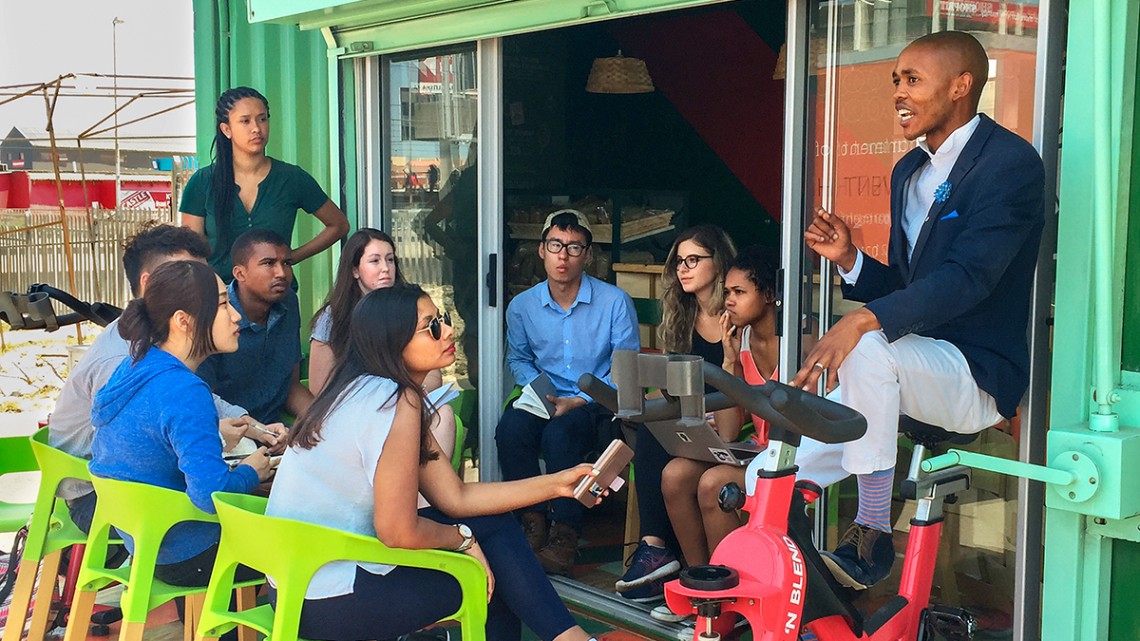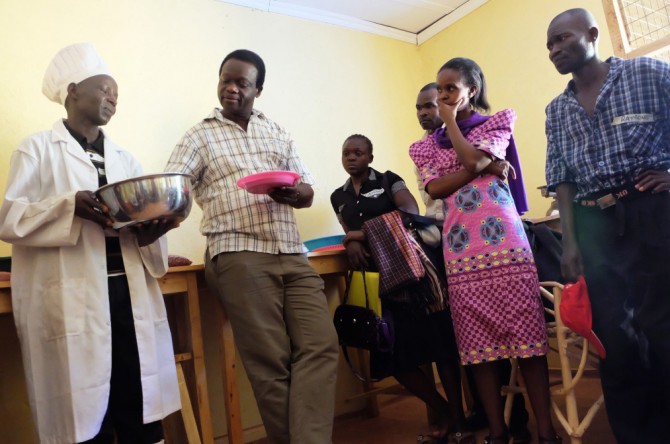
Members of the spinach and lavender SMART teams, both led by Ed Mabaya, met with Spinach King Lufefe Nomjana, right, outside his Cape Town café.
Student teams advise small businesses in Africa to help them thrive
By Sheri Englund
Lufefe Nomjana, a young entrepreneur from Khayelitsha township outside Cape Town, South Africa, is the Spinach King.
With tasty, gluten-free spinach bread and a vision to bring healthy food to low-income South Africans, his company has attracted international media attention. Nomjana’s marketing commitment is uncompromising: He named his son, now 3, Spinach Prince Nomjana. His café in a refurbished shipping container feeds locals and a steady stream of tourists.
His problem is right next door. A chain supermarket in the same shopping center sells white bread for half the price to hungry, cash-strapped families.
Nomjana’s company is one of four African social enterprises that partnered in 2017 with Cornell’s Student Multidisciplinary Applied Research Team (SMART) program, now in its 15th year. Part of the Emerging Markets Program in the Dyson School of Applied Economics and Management, SMART sends teams of undergraduate and graduate students to consult with small businesses as they face new marketing challenges in developing economies.
“All of us had completely different fields and areas of knowledge,” said Ryan Shen, a member of the Spinach King’s team and an MPA student in the College of Human Ecology’s Cornell Institute for Public Affairs. “We had people from agriculture, business, public policy – so we were able to learn from each other and think about problems in new ways.”
Traveling with Cornell faculty advisers, SMART teams meet and work on site with their international partners for two intensive weeks during winter session, then return to campus for a spring SMART course, where they compare notes with other SMART teams, complete their analysis and develop publishable case studies about their clients’ business solutions. Many team members continue to consult with their international partners pro bono after they graduate.
“We look for businesses doing something transformative for the community,” explained Edward Mabaya, assistant director of the Emerging Markets Program and director of SMART.
Mabaya led teams working with two South African partners, a lavender farm and Nomjana’s bakery and café. This year’s other SMART projects in Africa included a Rwandan essential oils business and Kenyan farmers developing high-protein porridge products. The four teams were supported by Global Cornell through the Andy Paul Africa Initiatives Fund. SMART also sent teams to Colombia and the southern U.S. in 2017.
Cape Town, South Africa
The Spinach King of South Africa has a flair for promotion. “Nomjana is very charismatic,” Mabaya said. “His biggest brand is himself.”
A black entrepreneur raised in poverty, Nomjana saw a need for healthier foods in the townships, where many people suffer from diabetes and dietary diseases. He developed spinach-based recipes, educated his neighbors about the health benefits and sourced the spinach from local growers.
With coverage from the BBC, CNN and local news, tourists discovered Nomjana’s café – but as Mabaya says, “the problem he set out to solve is in the townships, where his product is needed most.” The SMART team’s challenge was to help the Spinach King benefit from his good press while reaching out to local customers with limited purchasing power.
“Nomjana has a powerful feel-good story, but a feel-good story is not enough,” Mabaya said. “Cornell’s contribution is connecting his real-life story to money, so that the Spinach King’s brand and product work as a viable business model.”
Nomjana is proud to offer healthy meals that township residents can afford, such as two slices of spinach bread and a cup of butternut soup for $1.10. The SMART team created a marketing plan that uses word of mouth, including discounts for referrals, to increase local foot traffic. Nomjana is also capturing tourists’ goodwill to offset costs: Supporters can buy loaves to donate to needy households in the community. The team helped Nomjana build a website and advised him to sell aprons and other souvenirs with his popular logo.
Supermarkets like the one near the Spinach King’s storefront café remain low-priced competitors, but as his business grows, Nomjana is supplying baked goods to Cape Town retailers. “South Africa has a major national program to encourage black business ownership, management and hiring,” team member Shen said. The SMART team recommended ways to take better advantage of Black Economic Empowerment policies as Nomjana moves to scale up production.
Nandi Hills, Kenya
Yichang Liu, a fourth-year doctoral student in the field of food science and technology, joined the porridge project because of its connections to her own work.
Kenyans feed maize porridge to babies, eat it for breakfast or as a side dish, and drink a thin version during tea breaks. Two community farmer groups in the Nandi Hills region have developed healthy porridge blends that include legumes like soybeans and peanuts. “It’s a high-protein food that also improves soil fertility,” Liu said.
The farmers were already successfully raising the crops and selling their products on a small scale, but both groups needed to learn practical business and marketing skills to manage and expand their growing businesses. Led by Beth Medvecky, a research associate in the College of Agriculture and Life Sciences, the SMART team developed an intensive workshop tailored to the farmers’ needs, using peer-to-peer methods effective for adult learners.
The workshop included role-playing conversations with buyers, a practicum on business bookkeeping, and product testing with students from a neighboring school. The farmers recently reported on their progress. “They are more informed and feel more confident talking about their products to the public,” Medvecky said. “As a result, sales have generally improved – in some cases by 200 percent.”
With more accurate business records and pricing, both farmer groups are sure they’re turning a profit. Liu profited from the experience, as well.
“When you’re living with the local people and you’re doing important work together, that’s a very different thing than just traveling,” she said.
Sheri Englund is a writer for the Office of the Vice Provost for International Affairs/Global Cornell.
Media Contact
Get Cornell news delivered right to your inbox.
Subscribe